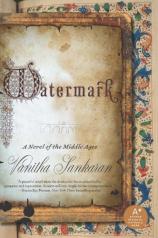Reading Group Guide
Discussion Questions
Watermark: A Novel of the Middle Ages

1. Elena, Auda's mother, is often talked about in terms of her sacrifice. How did this sacrifice affect Auda? How is this sacrifice similar and different from the story of the pelican told by the Archbishop?
2. Auda suffered two traumas at birth --- her albinism and the loss of her tongue. Which experience shaped her more?
3. How does Auda use her other senses and abilities to make up for her lack of voice?
4. Paper is discussed as a way to share knowledge among all people, thus equalizing everyone. Do you agree with this premise? Why or why not?
5. How is writing different from speech, both in terms of what and how something is communicated? Is there an inherent danger in writing, and in making that ability accessible to people of all backgrounds? Would the Inquisitors Manual be more or less fearsome if it were transmitted by the spoken rather than the written word?
6. What about the Good Men's philosophy cares the Church? How do piety and fear work against each other?
7. Why does Martin give the scribing job to Auda? What are his hopes for her?
8. Medieval beauty and love were spoken of both in terms of body and spirit. How do these concepts apply to Auda and Poncia? How do they apply to women today?
9. Watermarks were thought to be a way for heretics and infidels to communicate with each other. How do you think people might have used watermarks, and their designs, to communicate? Why is this different than a baker's mark, or other guild sign?
10. Medieval women often married for security rather than for love. Did Auda make the right choice in rejecting Edouard? How might her life have been different had she married him?
11. How does the Vicomtesse become a mother figure to Auda? Is she the type of mother Auda wished for? How does she displace or augment Poncia as a caretaker?
12. As Auda finds new freedom in her job as a scribe, Poncia retreats into her marriage and her faith. What events in Poncia's life cause this retreat? How is Poncia's shuttered life similar and different than Auda's childhood?
13. What does the Vicomte see in Auda? What does Jaime? How do the attentions of these men compare? Do they fall into the category of courtly love?
14. How is life at the Palace different from Auda's previous life? Was it a wise decision to send her to a place of such prominence?
15. Both Auda and Jaime seem to view the world differently than most others. How do they view each other?
16. The transition between the spoken and written word also brought with it ideas of single authorship, accountability and plagiarism. How does storytelling written by one author compare with the traditions of oral storytelling by multiple performers?
17. Courtly love seems to have different definitions according to men versus women. What are these differences? How do they compare to modern day attitudes from both genders?
18. It is easy to see why cheap paper may have had appeal for heretics wishing to share their ideas with many. Who else might have been attracted by paper? How could the Church have used paper to Her benefit?
19. Sacrifice is touted as a method of asking for something one wants in this book. What sacrifices have each of the characters made, and for what?
20. Auda's verses portray men of different stations, including those of the Church, as villains and predators. How are these views supported by her own experiences? How much of an influence does Jaime's past have on her?
21. What significance does Auda's gift of a watermark to her father have?
22. When Auda decides to trade her body for the Vicomte's help, whom does she betray the most --- the Vicomte, the Vicomtesse, her imprisoned father, Jaime, or herself?
23. Rene appears to have a deep effect on Auda. How do his actions impact her choices later?
24. The death of Martin and Auda's torture can be blamed on many people. How did each character's actions get them to this point? Are any of them truly guilty or truly innocent?
25. How does Auda learn that men and women can be equal? How does she use this philosophy?
26. Both the Archbishop and the Vicomte find themselves doing the unthinkable in favor of a larger good. Does the Inquisitor fit into this category as well? Why or why not?
27. The relationship between Auda and Poncia is close throughout the book. What did each sister expect of the other? How were these expectations met or disregarded?
28. Given Jaime's hatred for the Church and Auda's traumatic experience with Inquisitor, was it a surprise the couple ended up at a monastery? Does this mark a new life and change in attitudes for them?
29. Watermarks, and being marked by water, are discussed through the book. How do these concepts apply to each character?
30. What is the nature of true love? Do any of these characters find it?
Watermark: A Novel of the Middle Ages
- Publication Date: April 13, 2010
- Paperback: 331 pages
- Publisher: Avon
- ISBN-10: 0061849278
- ISBN-13: 9780061849275







